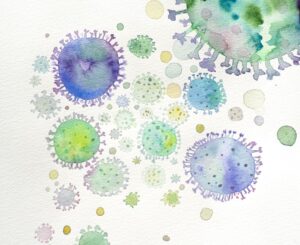Scripture: 1 Samuel 4-7
Learning Objectives:
- Students will learn the story of the Philistines capturing the Ark and how God punished them with illness when they took it from its home.
- Students will learn hygiene rules for sharing personal items and practice sorting items based on whether they carry germs.
- Students will practice what they learned about sharing things hygienically by eating a snack together and discussing the use of utensils and food.

Guiding Questions:
What things are and are not okay to share in order to be healthy?
How did passing the Ark around to other cities harm the people who were not intended to have it?
Materials: boxes/ hula hoops, items that can be shared (see list below), items that should not be shared (see list below), eating utensils and bowls for each child, snack for each child, antibacterial/ hand washing supplies
Procedure:
Review the story of the Philistines capturing the Ark. Emphasize how it was sent from the temple of Dagon to Gath and tumors plagued the people as it moved to them. Then it was moved to Ekron where the tumors occurred too. Explain to students that even though this plague was a punishment from God used to protect is Ark, many other diseases today are spread from person to person.
Discuss how germs are usually spread by mouth. Even if you do not touch someone’s mouth, objects such as cups can carry germs. Some parasites are even spread from hair such as lice. Discuss with students how to protect themselves from person-to-person illnesses and parasites by being careful about personal items that they share. Show students a variety of personal items and toys. Provide two boxes or hula hoops for students to sort items into. (Hula hoops are often good because students can see inside of it from all angles, unlike a box.) Label each category. Then let students sort them. Discuss why each one belongs in each category.
Not to Share:
• Food that has been near your mouth or plate (especially eating after someone)
• Eating utensils/ cups
• Hats/ hair accessories
• Brush
• Chap stick
• Toothbrush
• Used Bandages
• Medicine
• Glasses (because someone’s prescription can hurt your eyes)
Share (but wash your hands before and after use):
• Toys
• Crayons
• Books
• Soap
• Tools
End the lesson by having students share a snack together. Provide spoons, bowls, napkins, and a snack such as yogurt or applesauce. Emphasize that sharing by passing out the sealed food and unused utensils is kind. Also emphasize that not sharing their own things once they have them and begin eating is healthy. Be sure to remind them of the importance of washing their hands especially when eating or touching something that other people will be touching after you.
Additional Questions:
- If a friend is sick, how can you prevent getting their sickness?
- If you find out that a friend has lice, what can you do to prevent getting lice too?
Supplemental Activity: Have students collect things from home that they can donate to a local shelter. Discuss what types of things are (and are not) healthy and acceptable to donate. Some things might be good to donate, but need to be cleaned first (such as toy trucks and rubber balls). Usually only donate things that can be washed such as clothes and blankets, and plastic things. Be sure that nothing has sharp edges or is broken so that it does not accidentally cut someone. Do not donate hair brushes, used toothbrushes, etc.
